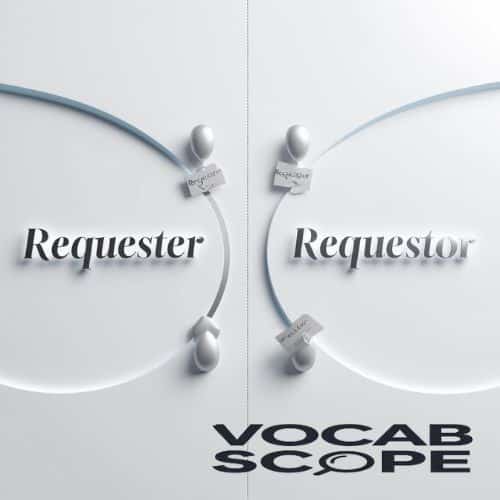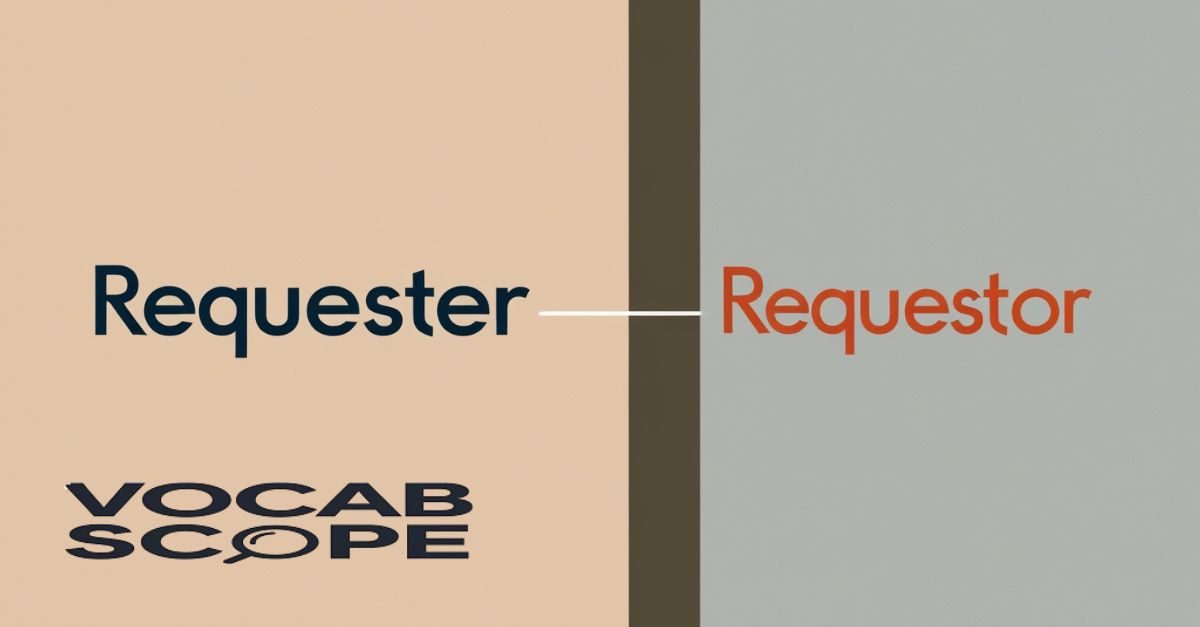The terms “requester” and “requestor” both refer to someone who makes a request. They are used interchangeably but have subtle differences. Understanding which term to use can clarify your writing.
Many people are unsure whether to use “requester” or “requestor.” Choosing the right spelling can enhance the professionalism of your writing. Understanding these nuances helps ensure clarity in your documents.
Deciding between “requester” and “requestor” depends on your context. “Requester” is more common in everyday writing. “Requestor” might be used in formal or legal documents.
What do “Requester” and “Requestor” Mean?
At its core, both “requester” and “requestor” refer to someone who makes a request. The choice between them often boils down to nuance and formality.
“Requester” is the more commonly used term in modern English. It’s straightforward and widely accepted in both formal and informal contexts.
For example, in a business setting, you might say, “The requester of the information should submit their application by Friday.”
“Requestor” is an alternative spelling that is less frequently used but still correct. It tends to appear in more formal or technical contexts.
For instance, a legal document might state, “The requestor must provide proof of identity before the records can be released.”
“Requester” vs “Requestor”

Understanding when to use “requester” versus “requestor” can help you communicate more effectively.
“Requester” is generally the preferred term in most scenarios. It is suitable for everyday communication and formal writing. If you’re writing a report or email, you would likely use “requester” to keep your language clear and accessible.
“Requestor” may be chosen for its formality or to fit specific technical fields. For example, in API documentation or legal contexts, “requestor” might be used to convey a precise role or responsibility.
Choosing the Right Term
Choosing between “requester” and “requestor” largely depends on your audience and the context.
- In everyday and most formal settings, “requester” is the safe choice. It’s familiar and widely understood, making your writing more relatable.
- For specialized documents or formal petitions, “requestor” might be appropriate. For example, in a legal petition, you might encounter the term “requestor” as it aligns with traditional legal phrasing.
Origins of the Word “Requester” and “Requestor”
Both “requester” and “requestor” have their origins in Latin. They stem from the Latin word “requaerere,” which means “to seek or ask for.” Over time, this evolved through Old French and Middle English to become “requeste” before splitting into the two modern forms.
- “Requester” has a more straightforward path from Middle English to contemporary usage.
- “Requestor” reflects an older or more formal usage, retaining some historical flavor from its evolution.
Examples in Context
To illustrate the use of “requester” and “requestor” in various scenarios, consider the following examples:
- Requester:
- “The requester must complete the application form before the deadline to receive a response.”
- “Our system will notify the requester once their application has been processed.”
- Requestor:
- “As the requestor, you must provide detailed information to support your claim.”
- “The requestor is entitled to access the confidential documents after verification.”
Requester
In everyday usage, “requester” is the term you are most likely to encounter. It fits well in both informal and formal contexts.
- Business Settings: “The requester is responsible for providing all necessary documentation.”
- Academic Contexts: “The requester must follow the submission guidelines outlined in the journal’s requirements.”
Requestor
“Requestor” adds a touch of formality and is often found in specialized or technical documents.
- Legal Documents: “The requestor must file a formal petition to initiate the legal process.”
- Technical Fields: “In API documentation, the requestor refers to the entity making the request.”
You will like: Excell or Excel: What is the Correct Spelling?
Synonyms of the Word “Requester”
Several synonyms can be used interchangeably with “requester,” depending on the context:
- Applicant: “The applicant should include a cover letter with their submission.”
- Petitioner: “The petitioner presented their case to the court.”
- Seeker: “The seeker of information should fill out the request form.”
- Inquirer: “The inquirer contacted the office for additional details.”
- Claimant: “The claimant requested compensation for the damages.”
Each synonym carries its own connotation, but all can be relevant depending on the situation.
Detailed Comparison of “Requester” and “Requestor”

Understanding the subtle distinctions between “requester” and “requestor” can help refine your writing and ensure the appropriate term is used based on context. Below, we delve deeper into the usage of these terms and provide a detailed comparison.
Usage in Different Contexts
“Requester” and “requestor” may be used interchangeably in many situations, but their usage can vary based on formality and the field of application.
- In Everyday Communication: “Requester” is more prevalent and sounds natural. For instance, when submitting a service request, you might say, “The requester will receive a confirmation email.”
- In Legal and Technical Fields: “Requestor” is often used to maintain a formal tone or adhere to specific jargon. For example, “The requestor must present valid identification before accessing restricted records.”
Key Differences Table
To provide a clearer picture, here’s a table highlighting the key differences and usage contexts for “requester” and “requestor.”
| Aspect | Requester | Requestor |
| Usage | Commonly used in everyday and formal contexts | Often used in legal and technical contexts |
| Frequency | More frequently encountered | Less common but correct |
| Formality | Standard, widely accepted | More formal or archaic |
| Context Examples | – “The requester submitted the form online.”- “Please ensure the requester provides accurate details.” | – “The requestor must comply with the regulations.”- “The requestor is entitled to a formal review.” |
| Modern Usage | Preferred in most modern texts and communications | Used in specific formal or legal contexts |
| Historical Roots | Evolved directly from Middle English | Retains a more historical or formal tone |
Learn about this: Feal vs Feel: Which One Should You Use?
Choosing Between “Requester” and “Requestor”

When deciding which term to use, consider the following factors:
- Audience and Purpose: For general purposes and informal communication, “requester” is appropriate. It’s user-friendly and widely understood. For documents requiring a formal tone, such as legal or technical writings, “requestor” may be preferable.
- Consistency: Whichever term you choose, be consistent throughout your document or communication. This consistency helps maintain clarity and professionalism.
Examples of Usage in Formal Documents
To illustrate how these terms might appear in various types of documents:
- Legal Document:
- “The requestor of the legal records must provide a written petition and proof of identity.”
- Business Report:
- “The requester is required to submit a detailed account of the information needed.”
Practical Tips for Writers
- Know Your Audience: Tailor your choice of “requester” or “requestor” based on the audience’s familiarity and the document’s formality.
- Be Clear and Precise: Use “requester” for general use to avoid confusion and “requestor” for specific contexts where formality is key.
- Review and Edit: Always review your document to ensure consistency in term usage and to match the tone and formality required.
Conclusion
“Requester” is the more commonly used term in everyday and formal writing. It is straightforward and widely accepted. “Requestor” may be reserved for specific contexts, such as legal or technical documents, where its formality is appropriate.
Understanding the subtle differences between “requester” and “requestor” can enhance your writing and ensure that you choose the right term for your audience and purpose. Whether you opt for “requester” or “requestor,” being aware of their nuances will help you communicate more effectively.

“Robert Henry is an experienced blogger with a passion for language and education. His insightful posts on Vocab Scope offer readers valuable tips on vocabulary and grammar. With a background in linguistics and a knack for clear, engaging writing, Robert is dedicated to helping others enhance their communication skills.”






